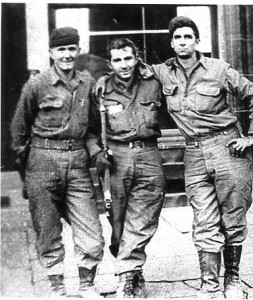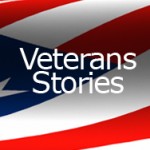
A Friend in Need is a Friend Indeed
by John P. Malloy, 75th ID, 291st IR
I worried and wondered if my best friend, Dean Lusjenski, had survived the recent vicious fighting at Grand-Halleux. Dean was with L (Love) Company in a machine gun section, in the 291st heavy weapons company. That company had sustained serious casualties in that battle. I decided I should find his company and see if he was still ok.
Dean and I had been called to duty on the same day in March 1943. He was a senior at Creighton University in Omaha, and I was a junior there. We had spent the entire war together and had become fast friends. We looked after one another, as soldiers often do. Now I wondered, and worried, what had happened to him during the vicious battles along the Salm River.
The 291 st Regiment had played an important role in counter attacking the retreating German forces. The Gl’s had suffered severe frostbite and trench foot because of the cold and snow. Huddling for days in a wet, cold, foxhole wore men down. This suffering, combined with battle wounds, had taken a severe toll.
I was lucky I was able to track him down. My job, as wire crew chief, gave me considerable independence and freedom of action. I knew my crew would handle any problems while I was gone. Earlier that morning the Third Battalion, Dean’s unit, had attacked a heavily defended hill-casualties were heavy. I knew the current action was centered in a small village about a quarter of a mile to the east. I took our jeep and headed that way. As I approached the village I stopped and proceeded on foot. When I reached the village center, I could see the German defenders had been forced back, perhaps five hundred yards. There was confusion. Medics evacuated wounded. Tanks slowly ground forward. An artillery spotter moved his vantage point.
Infantry units continued the attack. Apparently another unit had just been relieved. Those men were half hidden in doorways. Others hunkered down, waiting, hoping. They were a disheveled, bearded crew. They were exhausted. Most had not been out of their clothes for days. They hadn’t had a truly hot meal for some time. Artillery fire had devastated the area. Buildings were smoking shambles. Some still stood, in others, men sought what shelter they could find. An improvised aid station was operating. Medics treated bloody wounds. There was the awful smell of cordite-a reminder of death.
A winter sun shone weakly on the chaos. Just a month ago a pristine snow had drifted down, providing a beautiful blanket, covering this remote countryside. Now, brown replaced white. Brown clad warriors brought brown tanks, brown trucks, and brown cannon. Brown buildings burned. Dirty, brown soil lay exposed. It was an ugly place. This was not an unusual sight across France and Belgium. Our War Machine destroyed what little the Germans left when they fled.
There was occasional incoming mortar fire now; this was not a safe area. I tried to identify the units present. I could see that some Third Battalion Companies were involved in the firefight but I could not find L Company. I decided my efforts were futile. I couldn’t find my friend so I decided to return to my outfit. I retreated towards my jeep. The late afternoon light was turning to dusk. I worried about the drive. Driving in pitch black darkness was dangerous. I worried I might encounter a trigger happy Gl. He would shoot first and ask questions later.
Then I saw him. He was slumped in a ruined doorway.
“Dean, Dean is that you?”
He looked at me. I moved closer-he had an unfocused, zombie like, gaze. He stared vacantly.
“Lusienski-Lusienski it’s me, John.”
His only comment was,” I’m cold, I’m cold.”
“Dean I’m taking you with me. You need rest and a hot meal inside you.”
He mumbled,” I can’t. I’ve got to get back to my platoon.”
“You are coming with me and that’s that. Don’t give me a hard time.”
I walked him to the jeep. We took off. A commandeered farmhouse served as the Regimental CP. The wire section’s sleeping bags were on a dirt floor in an adjoining barn. I got Dean out of his overcoat. I removed his boots and put him into my sleeping bag. I covered him with an extra blanket. He slept eighteen hours. I brought him a hot meal. He slept again. When he woke he was a different man. We had a good conversation. We exchanged news. He had another good meal. Then it was time to go. His dry clothes and boots were ready. He got into his overcoat, put on his helmet, slung his weapon over his shoulder. I returned him to his company.
I didn’t see him again for several weeks. After the Bulge, the Division headed south and east to Colmar France near Strasburg. There we continued kitting Germans. Dean, in the weeks following the battles in the Ardennes and Colmar, was promoted to Staff Sergeant and awarded the Bronze Star for his leadership in operations in the Rhine River area.
Epilogue: After the war Dean Lusienski returned to his home in Nebraska. He married and had a family/He used the G\ bill to earn a PhD in Educational Psychology at the University of Nebraska in Lincoln. He served for many years as Principal for the world famous Boy’s Town. In later years, I occasionally traveled to Omaha from my home in Milwaukee. Dean and I would have dinner together. We talked about the early years. Dean died several years ago at the age of seventy.
Dean Lusienski was an outstanding example of Brokaw’s “The Greatest Generation”.
I still miss my best friend.
